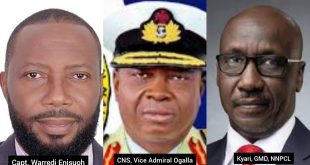 By Kenneth Jukpor
By Kenneth Jukpor
It’s already a fortnight into the year 2019. Where there successes in the Nigerian maritime sector in 2018? Who did what? To what effect and what where the overt and covert reasons one may ask? While these questions and possible answers may chart the course for a productive 2019, what is most important to the nation and its maritime sector is the present.
As part of efforts to get all sub-sectors and stakeholders in the industry focused on the issues that would improve the state of shipping in the country and guarantee a gratifying future, MMS Plus newspaper reached several key industry players and veterans.
Despite fears that electioneering make take centre stage as the nation’s general elections holds this year, operators express optimism that Nigeria could record significant improvement in the maritime sector and the polity’s economy in general.
During a chat with our correspondent, the Chairman, Ports Consultative Council (PCC) Otunba Kunle Folarin told MMS Plus that the oil and maritime sectors will play a more significant role this year in the political economy of the nation.

“Energy Income is a key component of the expected Gross Revenue while international trade will generate Internal Revenue from Customs tariffs. The ports will also play a very significant part depending on shipping traffic performance” he said.
However, he noted that there is a great concern on the pattern of Crude Oil production demand and supply as a result of the new regulations of the Organization of Petroleum Exporting Countries (OPEC).
“Firstly, OPEC intends to cut production in order to stabilize the sale benchmark while Non-OPEC producers intend to increase production. Secondly, Qatar wants to withdraw from OPEC. Thirdly, Nigerian cargo sale is sluggish at the moment therefore attaining the budget price and daily production forecast may be affected. Overall it will be a volatile sale and production terrain which has to be closely monitored” he explained.
Speaking from the standpoint of a freight forwarder, a Governing Council member of the Council for the Regulation of Freight Forwarding in Nigeria (CRFFN) Mrs. Princess Chi Ezeh described the year 2019 as ‘a wonderful year’.
She said; “The Nigerian Customs Service (NCS) has done a lot to ensure that freight forwarders comply to trade procedures and processes and we have seen an appreciable attitudinal change by freight forwarders in recent times. I expect this positive development to continue in 2019. As a governing council member of CRFFN, I also encourage freight forwarders to comply with Customs in the aspect of declaration’
Meanwhile, Ezeh admonished NCS and other regulatory agencies of government to provide opportunities for freight forwarders to learn about their processes before rolling them out for implementation. She said CRFFN would make this one of the cardinal requirements as we embark of registration of members.
According to her, one of biggest challenges in 2018 was the persistent increase in truck haulage cost but the prices have come down as a result of the efforts of the Nigerian Ports Authority (NPA) and the collaborative efforts of the truckers.
“The deplorable state of the roads also contributed to this problem but the road infrastructure is better now. The Apapa-Wharf road has been completed while the Tin-Can axis is under re-construction. The roads have become more accessible compared to the inaccessible state that we saw for most of 2018. That is also another good development going into 2019. However, considering the increased cargo throughput in the country, further effort should be made to encourage alternative means of cargo movement beyond the roads. I recommend the carriage of cargo through our waterways by barge” she opined.
She pointed out the issue of demurrage from shipping companies as a burden that should be addressed in 2019; noting that shipping companies and terminal operators should be engaged by the government on the issue.
She expressed confidence that the use of alternative means of transport of cargo will reduce the waiting time and ultimately the demurrage.
Also speaking on the 2019 aspirations for the Governing Council of CRFFN, she said; “We want to ensure that everything about freight forwarding is based on professionalism. We want to put an end to the era of touts at the ports and we can achieve this by ensuring that everybody that has interest in freight forwarding business is registered with CRFFN.
Mrs. Ezeh who heads the committee in-charge of registration of freight forwarders, added; “I’m very concerned about enhancing professionalism by getting more people registered especially those who are already taking part in the business at the ports.
“We also intend to get the truckers to be registered because they play a significant role in the freight forwarding chain and CRFFN is the umbrella regulatory body for the practice of freight forwarding” she added.
Indigenous ship-owners weren’t left out of the agenda-setting venture as the Lagos Coordinator, Nigerian Indigenous Ship-owners Association (NISA) Capt. Taiwo Franklin Akinpelumi told MMS Plus that in 2019, the number one issue ship-owners want to be addressed is the security of the nation’s waterways.
His words: “There is no way Nigeria could set an effective and formidable maritime agenda without considering maritime security. Nigerian coast is fast becoming like the Hall of Somalia where piracy and armed robbery at sea holds sway. This problem is telling on our operations and the premium Nigerians pay on insurance. The problem has also affected the nation’s access to cargoes because foreign vessels now have preference to take cargoes to Lome. They feel Nigerian waters aren’t safe enough”
Although he stated that NIMASA would stress its compliance to ISPS Code and the other efforts it has put in place to ensure safety, Taiwo noted that the issue isn’t about how much NIMASA has done but how effective such efforts and strategies have been in solving the problem.
“Is the agency achieving the desired results? If the noble strategies aren’t achieving the desired results then we have to change the tactics. I still find it unhealthy that NIMASA would prefer to say it has MoU with the Nigerian Navy and the Nigerian Airforce to secure the nation’s territorial waters whilst the security problem persists” he queried.
He also admonished NIMASA to take the onus of ensuring stakeholders understand the dictates of the ISPS Code and how NIMASA enforces it.
“More enlightenment would lead to a greater level of compliance and that would go a long way to grow local intelligence and secure the nation’s maritime domain. If NIMASA can focus on these issues for 2019 and make concerted efforts to grow local capacity, then we would achieve a lot in the maritime industry” he said.
Capt. Taiwo also advised all maritime agencies to jettison the myopic notion of setting targets for revenue generation but look towards growing the industry with special emphasis on local capacity.
“By growing the industry, especially the local operators, the ripple effect would bring more money for the government. If we tax the few shipping companies in the country until they close shop, where do we get future taxes from?” he added.
The President of African Women in Maritime (WIMAFRICA) Barr. (Mrs.) Jean-Chiazor Anishere also gave her aspirations for the womenfolk in maritime.
“My expectations for WIMAFRICA in 2019 is to have WIMAFRICA open more chapters in more African countries because we are aspiring to cover the continent. I also want WIMAFRICA to visit the International Maritime Organization (IMO) and play very important role in the area of empowering women in the maritime industry. Incidentally, this is IMO’s theme this year; “Gender Empowerment”
She also revealed that WIMAFRICA hopes to sign an MoU with United Nations Economic Commission for Africa (UNECA) on the aspect of funding WIMAFRICA projects and trainings.
“Happily we met with UNECA’s Executive Secretary/ CEO in Nairobi last year, and we had some fruitful deliberations in this regard. We will follow up on our deliberations and we look forward to attending a Gender is My Agenda Campaign (GIMAC) summit organized by UNECA next month and the African Union (AU) meeting on Trade facilitation in Africa, at the AU headquarters in Addis Ababa” she said.
Anishere also noted that WIMAFRICA would be attending the WMU Summit on women empowerment in Malmo, Sweden in March this year even as the Association looks forward to launching a first class journal on African Women’s role in the Blue Economy.
“We aspire to be more visible, vocal and more active in all areas of our focus and mission statement in 2019, even as we prioritize collaboration with other sister organizations like African Ship owners Association and the U. N. We have started with some Arab Organizations of Arab Women in Maritime, some Regional associations and the U.N” she added.
Anishere equally shared her aspirations as a legal practitioner with a special interest in Maritime law.
“My aspiration is for our appellate courts, particularly the Supreme Court, to ascribe promptness in terms of expeditious hearing to maritime appeals because of the peculiar nature of maritime cases. Maritime cases should be treated specifically as they do with political matters. Particularly that maritime is all about sea time and it’s a fact that the gateway to every nation’s economy is its port.”
“I also hope that in 2019, most of the outstanding international conventions ratified by Nigeria will be domesticated to enable the country enjoy the consequential benefits as a maritime nation. I also pray that Nigeria’s transport infrastructures will be taken as priority by the incoming government, so that we can eventually enjoy multimodal transportation and ease the stress on the roads. Even our road network and infrastructure should be maintained and further developed to reduce deaths; whilst the totality of good transportation network and infrastructure will bring about a truism on the ease of doing business in our country and a boom in foreign investments with its resultant benefits of job creation and wealth for our dear country” she added.
 MMS PLUS NG – Maritime, Aviation, Business, Oil and Gas News Online Newspaper with coverage in Maritime, Oil and Gas, Aviation, Power and Energy as well as Financial News
MMS PLUS NG – Maritime, Aviation, Business, Oil and Gas News Online Newspaper with coverage in Maritime, Oil and Gas, Aviation, Power and Energy as well as Financial News









